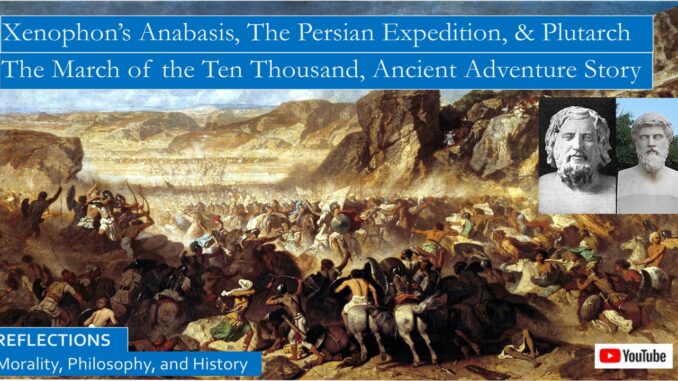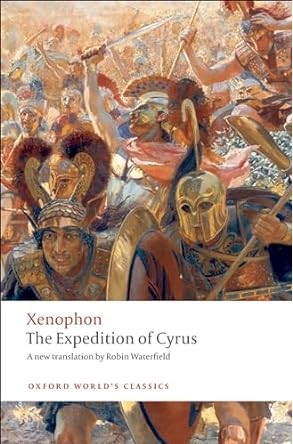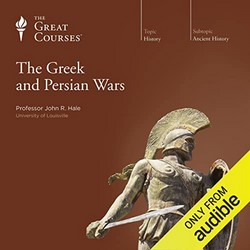
What can we learn by reflecting on Xenophon’s Anabasis, the Persian Expedition?
The Anabasis is Xenophon’s remarkable eyewitness account of the Greek mercenary army hired by Cyrus the Younger. Cyrus was challenging his brother Artaxerxes for the throne of Persia.
Although the Ten Thousand Greek hoplites won the battle militarily, this win was wasted when a spear ran through their patron Cyrus, killing him in battle.
Stranded behind enemy lines, the Greek army of Ten Thousand had to march for many miles and many months through enemy territory before they reached the Greek colonies on the shores of the Black Sea.
YouTube Script more with Book Links:
https://www.slideshare.net/BruceStrom1/lysis-platonic-dialogue-on-love-and-friendship-where-old-men-ogle-boys-at-the-gymnasium
Video for this blog: https://youtu.be/lU59WBQu3bc
Video for Robin Waterfield’s take on the Anabasis: https://youtu.be/sOZAKFfEnKw
https://seekingvirtueandwisdom.com/the-historian-robin-waterfield-reflects-on-xenophons-anabasis-in-persia-and-other-greco-persian-conflicts/
SUMMARY BY HISTORIAN WILL DURANT
The historian Will Durant summarizes this March of the Ten Thousand, led by Xenophon, “was one of the greatest adventures in human history. We are amazed at the inexhaustible courage of these Greeks, fighting their way on foot, day by day for five months, thorough two thousand miles of enemy country, across hot and foodless plains, and over perilous mountain passes covered with eight feet of snow, while armies and guerrilla bands attacked them in the rear and in front and on either flank, and hostile natives used every device to kill them, or mislead them, or bar their way.”[1]
CYRUS THE YOUNGER AND THE PELOPONNESIAN WARS
We first meet Prince Cyrus the Younger, second in line for the throne, and the Persian satraps Tissaphernes and Pharnabazus during Xenophon’s account of the latter stages of the Peloponnesian Wars. After Alcibiades burned his bridges at Athens and Sparta, he befriended Tissaphernes, the Persian satrap.
Plutarch tells us how Alcibiades “set about maligning and defaming the Spartans to Tissaphernes. He did not want the Persians to be too ready to help the Spartans and thereby destroy the Athenians but preferred to let them have a miserly amount of support,” so “both sides would exhaust each other and fall into the Persian king’s hands. Tissaphernes was easily convinced by this.”[2]
Comeback of Alcibiades in Peloponnesian War, according to Plutarch, Thucydides, and Xenophon
https://seekingvirtueandwisdom.com/comeback-of-alcibiades-in-peloponnesian-war-according-to-plutarch-thucydides-and-xenophon/
https://youtu.be/b7QLp1HrOMs
This Persian policy changed when the King of Persia, King Darius II, sent his younger son, Cyrus the Younger, to administer the Ionian provinces of Lydia, Greater Phrygia, and Cappadocia; and to assist the Spartans in their war efforts. Professor Kenneth Harl of the Teaching Company comments that the Spartan commander Lysander and Cyrus had an excellent working relationship, that Cyrus respected the competency of Lysander, and saw in Lysander a Spartan leader who could win battles when fighting the Athenians.[3]
Xenophon remembers, “Lysander went inland to visit Cyrus, and took with him the ambassadors from Sparta. They lost no time in telling Cyrus how badly, in their opinion, Tissaphernes had behaved, and they begged him to take a really serious and energetic part in the war.”
“‘That,’ said Cyrus, ‘is exactly what my father, the king, has asked me to do and that is what I mean to do myself. I shall do all that I can.’ He told them that he had brought five hundred talents with him. If that was not enough, he said, he would use his own money,” “and if that also ran out, he would break up his throne of silver and gold on which he sat.”[4]
Spartan Lysander Shows Mercy on Athens, Ending the Peloponnesian Wars
https://seekingvirtueandwisdom.com/spartan-lysander-shows-mercy-on-athens-ending-the-peloponnesian-wars/
https://youtu.be/giNzqNoOH3Y
In return for his funding that enabled the Spartans to win the Peloponnesian Wars, Prince Cyrus asked for Sparta’s assistance in challenging his brother Artaxerxes for the throne on the death of their father, King Xerxes. Plutarch tells us that “Cyrus wrote to the Lacedaemonians, or Spartans, bidding them to assist him with men,” he would supply horses and chariots.[5] Although most of the hoplites were from Sparta, many Greeks from other city-states joined the mercenary army also, including the Athenian Xenophon.
KING ARTAXERXES IS SUSPICIOUS OF HIS BROTHER CYRUS
Plutarch states that “Cyrus, from his earliest youth, showed something of a headstrong and vehement character; Artaxerxes, on the other hand, was gentler in everything, and was more yielding.” Artaxerxes was the eldest son of King Darius II and Queen Parysatis. Although Cyrus was the second born, he was the favorite of the queen.[6]
Xenophon tells us, “After Darius’ death and Artaxerxes’ ascension to the throne, Tissaphernes accused Cyrus, to his brother’s face, of plotting to kill Artaxerxes. The king believed this lie, arrested Cyrus, intending to kill him, but his mother Parysatis interceded and got him sent back to his province. Cyrus had been humiliated and had come close to losing his life, so, once he was back in his province, he began to make plans; he wanted never again to be in his brother’s power, and he wanted, if he could, to rule in his place.”[7] Perhaps Cyrus had no choice but fight for the throne as he would likely lose his life after their mother died.
Plutarch tells us that there were leading Persians who favored Cyrus, believing that “the times needed a man of great spirit, an excellent warrior, and a lover of his friends, and that the largeness of their empire absolutely required a bold and enterprising prince.” Cyrus felt that his brother Artaxerxes “was such a coward and so little like a man, that he could neither sit on his horse while hunting, nor sit on his throne in time of danger.”[8]
CYRUS AND HIS ARMY MARCHES TO BABYLON
Cyrus started gathering a large army near the west coast of Asia Minor, raising the suspicions of Tissaphernes. Although he was quite wealthy, paying such a large army would challenge any usurper to the throne. At the beginning of their journey, Xenophon tells us about Cyrus reviewing the troops with the Queen of Cilicia.
To impress the Cilician queen, Cyrus asked that the Greeks hoplite infantry form a phalanx and march as they would for battle. “When the trumpet sounded, they advanced with their weapons leveled. Soon they were moving faster and faster, until with a shout the soldiers spontaneously broke into a run and charged towards the camp. This terrified the barbarians,” as Xenophon describes the Persians. “The Cilician queen fled in her carriage,” “while the Greeks, hugely amused, dispersed to their tents.” “Cyrus was delighted to see how frightened the barbarians were by the Greeks.”[9]
The further and further the Greeks, and in particular the Spartans, marched into the interior of Asia, the more nervous they became. They had thought that they would be serving in battles in the western provinces controlled by Cyrus, only the Greek commander knew the true destination. Cyrus deceived his troops, saying that his enemy was a fellow satrap, Abrocomas, at the Euphrates River. Plus, it was clear that Cyrus would not pay for ships to return any unhappy soldiers back to Greece.
When they reached the Euphrates River, close to Babylon, the capitol of the Achaemenid Empire, Cyprus finally disclosed to the Greek generals his true objective, to overthrow the Great King of Persian, his brother Artaxerxes II. Cyrus promised a bonus to the soldiers when they reached Babylon, plus he would pay them full wages during their travel time back to Greece, [10] a truly generous offer he could never fulfill.
Xenophon discusses military strategy, saying that “Cyrus’ thinking was that the faster he went, the less prepared the king would be for battle, and that every delay would allow the king to assemble a larger force.”[11]
After a hard three-day march, Cyrus called a meeting of the Greek generals and commanders, saying, “Men of Greece, it is not because I am short of barbarian troops that I have brought you here to fight on my side, it is because you are, in my opinion, braver and better than hordes of barbarians.” “Prove yourself worthy of the freedom you possess. I envy you this freedom. Why?? I assure you that I would choose freedom over all my wealth.”
CYRUS BATTLES ARTAXERXES FOR THE THRONE OF PERSIA
Xenophon says that before the battle, Cyrus’ army included 10,400 Greek hoplite infantry, plus 2,500 peltasts, or Greek light infantry, plus 10,000 Persian troops under General Ariaeus. Xenophon estimates the Great King’s army to number 1,200,000 with 200 scythe-bearing chariots, though scholars estimate in a footnote that there were 60,000 opposing troops. Alexander the Great would later win many battles when similarly outnumbered by the Persians. The satrap Tissaphernes was among the opposing Persian generals.[12]
Where was the army of the Great King? Xenophon tells us, “Early in the afternoon a cloud of dust appeared, looking at first like a white cloud in the sky.” “Before long, as the enemy drew near, there were flashes of bronze, and then the tips of their spears.”
“Cyrus ordered Clearchus, the Greek commander, to lead his men against the center of the enemy formation, because that was where the king was. ‘If we win there,’ Cyrus said, ‘we’ll have accomplished all we came for.’ But although Clearchus had seen how compact the enemy’s center was, and although he had been informed that the king was beyond Cyrus’ left wing, for king’s troops far outnumbered Cyrus’ troops.” “Nevertheless, Clearchus was reluctant to open a gap between the right wing and the river, which would have made him vulnerable to being outflanked on both sides, and so he told Cyrus that he would make sure that things went well.”
Then the Greeks “began to advance against the enemy” “All the soldiers cried out their usual war-cry to Enyalius, god of war, and began to run,” “clashing the shafts of their spears against their shields to scare the enemy horses. Before they were within bow-shot, the barbarians caved in and fled.”
So far, so good, “Cyrus saw that the Greeks had defeated the unit opposite them and had set out in pursuit.”[13]
Plutarch tells us, “Clearchus pleaded with Cyrus before the fight to retire behind the combatants.” Cyrus replied, “Would you have me, who aspire to empire, show myself unworthy of it?” “But if Cyrus erred in plunging headlong into battle, ignoring his own safety, Clearchus was as much to blame, if not more, in refusing to lead the Greeks against the main body of the enemy, where the king stood, and in keeping his right wing close to the river, for fear of being surrounded.” “If he wanted to be safe,” “it would have been best for him to stay home.”[14]
But this impetuousness in battle helped Alexander the Great, and Cyrus the Great before him, win the major battles against their foes. In two major battles, when Alexander the Great’s contingent charged the line at King Darius, the Great King fled, breaking the morale of his troops, leading to his defeats.
Plutarch relates how this personal battle between Cyrus and Artaxerxes could have gone either way. “Cyrus, mounted on a noble and headstrong horse,” charged with his bodyguards his brother King Artaxerxes and his retinue. A javelin was thrown at Cyrus, “but his coat of mail stoutly repelled it, and Cyrus was not wounded;” but he reeled from the blow.
Plutarch continues, “Cyrus furiously attacked the guard of Artaxerxes, wounded the king’s horse, dismounting him,” he quickly mounted another horse. “Cyrus, again spurring his horse, struck down Artaxerxes.” Recovering, the “king struck Cyrus with a javelin.” This was not fatal, Cyrus pierced with a lance the breast of the king, penetrating two inches past his armor, causing Artaxerxes to fall from his horse.
But “Cyrus’ tiara fell from his head, and a young Persian” “struck a dart into one of his temples near his eye, so that Cyrus, swooning and senseless, fell off his horse.” Cyrus was led off the battlefield, but he soon died.”[15]
EULOGY: COMPARING CYRUS THE YOUNGER TO CYRUS THE GREAT
After Cyrus the Younger dies in Xenophon’s Anabasis, he delivers a eulogy, comparing him to a prior mighty king, Cyrus the Great, founder of the Persian Empire. Xenophon had written a famous biography of Cyrus the Great, the Cyropaedia. The two Cyruses were not direct blood relatives, as King Darius I was not a direct descendant of Cyrus the Great.
Xenophon lists the many similarities between the two Cyruses. “Of all the successors of Cyrus the Great, no Persian was a more natural ruler and none more deserved to rule.” “First, at school he was the best of his generation at everything. All the sons of Persian noblemen are educated at court.” Furthermore, “Cyrus was more respectful than any of his peers and more obedient to his elders, even then his inferiors in rank.” Obedience is an important martial virtue for Xenophon.
Xenophon’s Cyropaedia, Biography of Cyrus the Great, King of Persia
https://seekingvirtueandwisdom.com/xenophons-cyropaedia-biography-of-cyrus-the-great-king-of-persia/
https://youtu.be/E4BFSIpHHGk
“Second, Cyrus adored horses and was particularly good at handling them. Third, there was no one who was keener to learn the military skills of archery and javelin, and no one who practiced them more assiduously.”
Like Cyrus the Great, “he was not only fond of hunting, Cyrus the Younger also relished the risks when facing wild creatures. A she-bear once charged him, but he engaged the creature without flinching and was dragged from his horse,” “in the end killing the beast.”
Xenophon says that when he was appointed satrap of some western provinces, “Cyrus demonstrated how he valued his personal integrity when making a treaty or entering into a contract.” Admittedly, Cyrus’ personal integrity was damaged when he deceived the Greeks about the reason why he hired them, not telling them their job was to overthrow the Great King until they reached the Euphrates River near Babylon.
Xenophon says there “was a story of how Cyrus used to pray to live long enough to repay with interest both those who had done him good and those who had injured him.” But he would also “punish criminals with unstinting severity, and one could often see, by the side of the busy roads, people who had lost feet, hands, or eyes.”
Xenophon lists the other qualities of Cyrus that good monarchs should possess. “Cyrus thought it essential to make those who wanted to stand out for their justice wealthier than those who sought to profit from injustice.” Cyrus was not eager to plunder, “he never took land away from people who managed their estates with sufficient expertise and justice to improve the land and generate an income from it, but he always added to what they had.”
Cyrus possessed another virtue valuable for a king. “There was no one better than Cyrus at looking after all his friends, as long as they were loyal and helped him achieve whatever goal he sought.”[16]
THE GREEKS WON THE BATTLE, BUT CYRUS, THEIR BENEFACTOR, DIED
The Greeks were winning, Xenophon remembers, “the enemy was in full flight as the sun was setting.” “The Greeks were surprised the king was nowhere to be seen.” “They had no idea he was dead; their best guess was that either he was chasing the enemy, or he had ridden on ahead in order to occupy some strategic point.”
After some discussion, they decided to return to camp, only to find the enemy had stolen their possessions, including their provisions, and food and drink. They had not time to eat their midday meal, and they would also do without supper, after fighting all day under the hot sun.[17]
The Greeks did not learn that Cyrus had died until the next morning. But the immediate concern was simply, What is for breakfast? This was not a trivial question, yesterday’s breakfast was their last meal, and they had been engaged in hand-to-hand combat for many hours since then. Xenophon’s Anabasis discusses two important topics on their trek to the Greek colonies on the Black Sea. Where will we find our next meals? The Greeks had ten thousand hungry soldiers. How can we defend ourselves against the enemies who follow us and whom we meet on the way?
This is perhaps why, in Xenophon’s Cyropaedia, Cyrus the Great never forgot that logistics was key to winning battles. His soldiers needed ample meals more than courageous pep-talks to fight well.
Xenophon’s Cyrus the Great said, “Bear this maxim before all others, never put off the collecting of supplies until the day of need.” Then “you will be free from blame from your soldiers, you will be more respected,” “your troops will then follow you with greater readiness.”
Xenophon’s Cyropaedia, Moral Sayings of Cyrus the Great, King of Persia
https://seekingvirtueandwisdom.com/xenophons-cyropaedia-moral-sayings-of-cyrus-the-great-king-of-persia/
https://youtu.be/Y3ULbvPEmik
For breakfast, the men “slaughtered the oxen and asses they were using as yoke-animals.” From the battlefield they “collected a great many light shields and abandoned carts.” These were fuel for the fires “to boil meat so they had food for that day.”
The Greeks, at this point, only wanted to return to Greece. The Persians were reluctant to attack the Greeks. The Persians sent a delegation to the Greeks asking them to “surrender their weapons and go to the king’s court to see if they might meet with good fortune there.” After all, the new Persian king often hired mercenary troops.
There was discussion among the Greeks, but Clearchus told the Persians, “If we are to be king’s friends, we’d be worth more as friends with our weapons in our hands rather than in someone else’s, and if we’re to be his enemies, we’d be more effective enemies with our weapons in our hands rather than in someone else’s.”[18] Which is also good life advice.
In these discussions, the Greeks chose the longer route home going north, since that route had more villages and fewer deserts, which meant more provisions along the way. Xenophon remembers, “At dawn the next day, Clearchus ordered the Greeks to arm themselves and take up the same positions they had held during the battle.”[19]
The king’s delegates approached them about a truce. The Greeks responded, no breakfast, no truce. “Tell the king,” Clearchus said, “that we must first fight. Fro there is no food for our morning meal and it would be a bold man indeed who would negotiate with Greeks about a truce without having supplied them with their morning meal.”
The truce was concluded, the Greeks were permitted to buy supplies to feed their troops, and to take provisions from villages, if need be, but they agreed not to molest the villages and to refrain from burning the villages. But the Greeks still marched in battle order.
The satrap Tissaphernes then graciously offered to guide them on their way home, providing them with continued provisions. The Greeks were in a bind. The Greeks told the Persians: “We would rather make our way home without harassment, but if anyone initiates hostilities against us, we will defend ourselves, with the help of the gods, to the best of our ability. However, we will also do our best to surpass the generosity of anyone who takes the lead in helping us.”[20]
The Greeks and Persians traveled north, setting up separate camps for many weeks. When they crossed the home province of the queen, Tissaphernes let them take anything they liked except for slaves out of spite. Provisions were plentiful.[21]
THE PERSIAN SATRAP TISSAPHERNES DOUBLE-CROSSES THE GREEKS
Clearchus unwisely decides to ease tensions with Tissaphernes, telling him, “We Greeks find no evidence that you are trying to injure us,” neither do we. Clearchus asks, “Could we banish this mistrust?” Clearchus stayed at the Persian camp for the evening meal, and safely returned to the Greek camp in the morning with Tissaphernes’ invitations for a friendly meal with all the generals.
Xenophon remembers, “Some of the soldiers argued that the commanders and generals should not all go, and that Tissaphernes was not to be trusted; but Clearchus was strongly insistent and eventually got them to agree that five generals and twenty company commanders could go,” with two hundred soldiers who would buy provisions.
The Persians quickly slaughtered the soldiers, Xenophon says the generals were “taken to the king and beheaded,” other sources say this happened later.
Alone, Nicharchus escaped. “He reached the Greek camp, holding his entrails in his hands from a wound to the guts, and told them what happened. The Greeks were terrified, and they ran to get their weapons, thinking an attack on the camp was imminent.” But no, Tissaphernes sent an armed delegation to argue who was at fault for the incident![22]
SOCRATES HAD WARNED XENOPHON AGAINST BECOMING A MERCENARY
At this moment of treachery, far behind enemy lines, Xenophon reflects on how Socrates sought to dissuade him from embarking on this mercenary adventure. Xenophon remember that “Socrates thought that friendship with Cyrus” might be unwise, as the Athenian officials “believed that Cyrus wholeheartedly supported the Spartans against the Athenians” in the last phase of the Peloponnesian Wars, where Athens was defeated. “Socrates advised Xenophon to go to Delphi and consult the god about whether or not he should go.”
Instead, “Xenophon asked Apollo which of the gods should receive his sacrifices and prayers to ensure that the journey he had in mind would go honorably and well, and to guarantee a safe return after a successfully completed endeavor, and in his response, Apollo named the gods to who he should sacrifice.”
It was common practice for a seer to slaughter a sacrificial animal before an important battle to see if the entrails revealed whether the gods would send a good omen. Xenophon, if he received a bad omen, would order the slaughter of another animal, then another one, then another one, until the gods gave him a good omen.
THE GREEKS ELECT XENOPHON TO BE THE LEADING GENERAL
It was evening, Xenophon fell asleep briefly, “dreaming that the thunder rumbled, and lighting struck his family home and brilliantly illuminated it all.” Awakening, he gathered the remaining commanders, urging them that they must act to defend themselves. As dire as the circumstances were, there was a silver lining. When the “Persians dissolved the truce, they also dissolved their advantages and our helplessness. Now these goods of theirs can be won by whoever proves themselves braver.” The Greeks are “hardier and more courageous.” “If the gods grant us victory as before, our opponents will be easier to wound and kill.”
Xenophon urges them to elect generals and commanders, because leaders instill discipline, and “discipline makes for survival, whereas lack of discipline leads to loss of life.” Xenophon repeats what he attributed to Cyrus the Great in his Cyropaedia. “Wars are not won by numbers or strength. When one side, thanks to the gods, attacks with more confidence, their foes invariably give way before them.”
Xenophon continues, “In warfare, those who seek to stay alive often die cowardly and ignominious deaths,” “while those who strive for noble deaths in battle are those who often reach old age.” We must realize these truths “to instill courage in our men.”[23]
Like Winston Churchill, Chirisophus of Sparta speaks, “The situation demands that we show ourselves to be men of valor. We must not give in, but we must endeavor to win a glorious victory and save ourselves if we can; if we cannot, let us at least meet death with honor, and as long as we are alive, let us never fall into the hands of the enemy.” “You see that our enemies didn’t dare to open hostilities against us until they had made prisoners of our generals.”
Xenophon then spoke, We must “be optimistic about our survival. We have stayed true to the oaths we swore before the gods, while our enemies have lied and broken the truce, in violation of their oaths.” Thus, “the gods are like to line up against our enemies and fight on our side, and the gods are capable of humbling the strong in an instant.” Xenophon reminded them of the Battle of Marathon, “when the Persians invaded in enormous numbers with the intention of obliterating Athens, the Athenians heroically stood up to them all by themselves and beat them.”
Histories of Herodotus, The Greeks Defeat the Mighty Persians in the Greco-Persian Wars
http://www.seekingvirtueandwisdom.com/histories-of-herodotus-the-greco-persian-wars/
https://youtu.be/JjNcyLo54ko
Xenophon also reminded them how the Greeks defeated the massive army and naval armada sent by the Persian King Xerxes some years later.
The Greeks Triumph in the Battle of Salamis, Aeschylus and Herodotus: The Greco-Persian Wars
http://www.seekingvirtueandwisdom.com/aeschylus-and-herodotus-the-battle-of-salamis-greco-persian-wars/
https://youtu.be/cabAkQwHnlk
Xenophon, their newly elected general, concluded, “If you want to see your families again, summon up your courage.” “If you want to survive, do your best to win, because it is the winners who kill and the losers who die; and if you want to get rich, do your best to conquer, because victors not only keep what is theirs, but also take what belongs to the losers.”
Xenophon advised, and all agreed, that they travel lighter and nimbler. The carts and tents were burned, all horses would be fitted for battle, and all excess baggage was discarded, so they would have as many men under arms and as few men carrying baggage as possible.[24]
The Greeks marched in battle formation, in company columns rather than phalanx squares, defending themselves from attacks by the Persians, outflanking mountain passes, finding provisions in the towns they encountered, carrying the wounded with them, for many miles and many days.
THE GREEKS CROSS THE MOUNTAINS INTO ARMENIA
The Greeks left the Persians behind them as they encountered the mountains south of Armenia, where they encountered the “Carduchians, a belligerent, mountain-dwelling people who had never submitted to the Persian King.” Once a large Persian expedition was wiped out when they invaded their lands.[25]
Xenophon remembers, “the Greeks spent seven days marching through Carducian territory, there were battles every single day, and they suffered more losses than on all the occasions they had clashed with the king and Tissaphernes put together.” But then, on the other side of the river, they saw Armenian armed horsemen and infantry lined up to stop them from crossing.
The Greeks stayed in their camp that night, not knowing what to do. The next morning, a young man came to Xenophon and told him he saw a forested spot in the river downstream where locals were able to cross on foot. The army started crossing, while Xenophon had some forces feint towards the protected spot of the river. When sufficient horsemen crossed, they took the high ground, and the Armenians pulled back, fearful of being flanked. There were few casualties during this crossing.[26]
The governor of Western Armenia, Tiribazus, offered a truce to the Greeks, the Greeks could take whatever provisions they needed, but they agreed not to burn any houses. Provisions were plentiful, but after traveling for three days, it started to snow, and then it snowed heavily. For many days, the Greeks trudged on, hungry, freezing, with frostbite, with men succumbing to the cold, with some men finding it difficult to walk. They had to fight and outflank more enemies on more snowy mountain passes; luckily, they found provisions in villages, as many in the army were starving.
THE TEN THOUSAND REACH THE BLACK SEA AND GREEK COLONIES
Finally, when the Greeks reached a mountain called Theches, “a huge cry went up.” Xenophon was bringing up the rear, he remembered he feared they were under attack. “The more men who reached the front, the louder the cry became.” Xenophon and some cavalry rode up to the front, “before long they heard the soldiers shouting: ‘Thalatta! Thalatta! The sea! The sea!” They had finally reached the Black Sea! “When everyone reached the top of the mountain, they immediately fell into one another’s arms, even the generals and the company commanders, with tears in their eyes.”[27]
The Greeks were not yet halfway to their destination, and the Bosporus straits were far away, but they were on friendlier territory. Many of the cities on the shores of the Black Sea were autonomous Greek colonies, though some regions were barbarian and hostile, but nobody wanted a force of eight thousand soldiers to linger, as several thousand had perished in battle or succumbed to the elements. One Spartan commander sailed home to request cargo ships to ferry them home, but Xenophon said they could not wait, they were able to find ships for part of the way, particularly for the wounded and sick, and in some stretches they marched as before.
Xenophon urged the army to stick together so they could all survive. At times they allied themselves with friendly cities in their disputes with their neighbors. Halfway across the Black Sea shores, the Greeks had to battle the army of the Persian satrap Pharnabazus, whom they defeated. At Byzantium, then a trading city aligned with Sparta, the Greeks burst into the city walls. Xenophon convinced them to stand down and not sack the city regardless of the injustices they had faced, as it would be foolish to antagonize the Spartans. Xenophon recalls the many challenges the Greeks faced, the Greeks’ adventures traveling along the shore of the Black Sea cover three of the seven books of the Anabasis. Finally, at Pergamum the remaining Greeks meet the Spartans. Many of the men join the Spartan army to help fight for the Greeks in Ionia, while some, including Xenophon, return home to Greece. [28]
DISCUSSING THE SOURCES
When students were taught Greek in high school, the crisp Greek of Xenophon’s Anabasis, his eyewitness account of the Persian Expedition, was often one of the first Greek works they studied. This is one of the ancient world’s most beloved adventure stories. The Anabasis inspired Alexander the Great to invade Persia, for if these Ten Thousand Greek mercenaries could stand down the Persian Army, marching thousands of miles to the friendlier Greek colonies of the Black Sea, wasn’t the Persian Empire ripe for the taking?
We recommend that you first read Xenophon’s Cyropaedia, a biography of Cyrus the Great, there are many parallels between Cyrus the Great and Cyrus the Younger. Much of the advice that Cyrus offers in the Cyropaedia was learned by Xenophon when he led the Greek forces out of the Persian heartland back to the Greek world. In our other videos on Xenophon’s, The History of My Times, tells us the history of the latter Peloponnesian Wars and the history leading up to the Anabasis.
Why did the Greeks survive this march through the heart of Persia and beyond? Xenophon was both an excellent leader, and an imaginative tactician, willing to experiment and adapt standard military strategy, both offensive and defensive, to the unique situation where a military force simply needed to survive with minimal casualties while crossing hostile terrain. We mentioned some of his innovative tactics, if you are interested in learning more about them, consult Dr Wikipedia, he quotes many scholars interested in Xenophon’s clever tactics.[29]
We also have a video on book reviews on Greek History and Philosophy.
Book and Lecture Reviews of Ancient Greek History and Philosophy
http://www.seekingvirtueandwisdom.com/book-and-lecture-reviews-of-ancient-greek-history-and-philosophy/
https://youtu.be/472aVKkPsk8
[1] Will Durant, The Story of Civilization, Volume 2, Life of Greece (New York: Simon and Schuster, 1966, 1939), Chapter XIX, p. 460.
[2] Plutarch, Greek Lives, Alcibiades (New York: Oxford University Press, 2008, 1998, originally 100+ AD), Chapter 25, pp. 243-244.
[3] Professor Kenneth Harl, The Teaching Company, The Peloponnesian Wars, 2007.
[4] Xenophon, Hellenica, A History of My Times, translated by Rex Warner (New York: Penguin Classics, 1979, 1966, originally after 362 BC), Book 1.5.2-3, p. 74.
[5] Plutarch, Plutarch’s Lives, Volume 2, Life of Artaxerxes, Dryden Translation, p. 648.
[6] Plutarch, Plutarch’s Lives, Volume 2, Life of Artaxerxes, Dryden Translation (New York: The Modern Library, 2001, 1992, originally 100+ AD), p. 647.
[7] Xenophon, The Expedition of Cyrus the Younger, Robin Waterfield, translator (New York: Oxford University Press, 2005, 2009, originally 300s BC), and Introduction, Book 1, Chapter 1, p. 3.
[8] Plutarch, Plutarch’s Lives, Volume 2, Life of Artaxerxes, Dryden Translation, p. 648.
[9] Xenophon, The Expedition of Cyrus, Robin Waterfield, translator, Book 1, Chapter 2, pp. 6-7.
[10] Xenophon, The Expedition of Cyrus, Robin Waterfield, translator, Book 1, Chapters 3-4, pp. 9-15.
[11] Xenophon, The Expedition of Cyrus, Robin Waterfield, translator, Book 1, Chapter 5, p. 17.
[12] Xenophon, The Expedition of Cyrus, Robin Waterfield, translator, Book 1, Chapter 7, p. 22 and 202.
[13] Xenophon, The Expedition of Cyrus, Robin Waterfield, translator, Book 1, Chapter 8, pp. 23-25.
[14] Plutarch, Plutarch’s Lives, Volume 2, Life of Artaxerxes, Dryden Translation, p. 649.
[15] Plutarch, Plutarch’s Lives, Volume 2, Life of Artaxerxes, Dryden Translation, pp. 651-652, also told by Xenophon, The Expedition of Cyrus, Robin Waterfield, translator, Book 1, Chapter 8, pp. 23-26.
[16] Xenophon, The Expedition of Cyrus, Robin Waterfield, translator, Book 1, Chapter 9, pp. 26-29.
[17] Xenophon, The Expedition of Cyrus, Robin Waterfield, translator, Book 1, Chapter 10, p. 32.
[18] Xenophon, The Expedition of Cyrus, Robin Waterfield, translator, Book 2, Chapter 1, pp. 33-36, and Xenophon, Cyropaedia, The Education of Cyrus, translated by Mr Dakyns, Amazon reprint, Book 1, Chapter 6.10, p. 20.
[19] Xenophon, The Expedition of Cyrus, Robin Waterfield, translator, Book 2, Chapter 2, p. 37.
[20] Xenophon, The Expedition of Cyrus, Robin Waterfield, translator, Book 2, Chapter 3, pp. 39-42.
[21] Xenophon, The Expedition of Cyrus, Robin Waterfield, translator, Book 2, Chapter 4, pp. 43-45.
[22] Xenophon, The Expedition of Cyrus, Robin Waterfield, translator, Book 2, Chapter 5, pp. 46-50.
[23] Xenophon, The Expedition of Cyrus, Robin Waterfield, translator, Book 3, Chapter 1, pp. 55-60.
[24] Xenophon, The Expedition of Cyrus, Robin Waterfield, translator, Book 3, Chapter 2, pp. 61-66.
[25] Xenophon, The Expedition of Cyrus, Robin Waterfield, translator, Book 3, Chapters 3-5, pp. 67-77.
[26] Xenophon, The Expedition of Cyrus, Robin Waterfield, translator, Book 4, Chapter 3, pp. 84-88.
[27] Xenophon, The Expedition of Cyrus, Robin Waterfield, translator, Book 4, Chapters 4-7, pp. 89-101.
[28] Xenophon, The Expedition of Cyrus, Robin Waterfield, translator, Books 5-7, pp. 106-193.







3 Trackbacks / Pingbacks